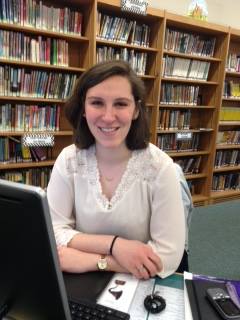 Emily Witkowski
Emily Witkowski
Children’s Librarian
Maplewood Memorial Library
1. Tell us about your current position and what you do.
My job responsibilities include collection development (a.k.a. buying for and assessing our juvenile collections), readers advisory, reference, programming, and community outreach. Because we also have a branch library in Maplewood, we work with adult users too, helping people apply for jobs, rewrite resumes, find information, etc.
2. What are some past jobs/positions you have held?
Some of my past jobs include working as a student worker in Instructional Technology at TCNJ, a Reference Assistant at the Alexander Library at Rutgers, and the Maker Coach for the Piscataway Public Library’s Summer of Make which is a hands-on STEAM program for grades 3-12. I also participated in quite a few internships which included one in the Ewing High School Media Center, in the marketing department at Princeton University Press, on NJLA committees, with the Theatre Library Association, and in the Science and Engineering Library at Columbia University.
3. How did TCNJ and the major prepare you for what you are doing today?
I grew up with my parents drilling into my brain that it is up to you to make the most out of every situation, so I feel like I got a lot out of every TCNJ class I took because I went into every class thinking about how it applied to me and my career goals. But in particular, I felt that my two 499s were incredibly useful purely because of the caliber of research required of them. I also took Methods of Teaching Secondary English which helped to familiarize me with the “of the moment” titles for juvenile and young adult collections as well as how to encourage kids to enjoy reading and think critically about reading. In addition, my two TCNJ internships (at Ewing High School and Princeton University Press) helped to give me great hands on experience in the field I knew I wanted to be in as well as in an associated field (publishing) to broaden my horizons.
4. Do you have favorite memories of the program?
I loved how communal the English department was. I found myself becoming friendly with professors I never even had the opportunity to have a class with just from spending a lot of time in Bliss, which worked to my advantage when it came time for recommendations and advice. Sigma Tau Delta conferences and events, as well as my time spent traveling were also very special to me.
5. What skills are the most important ones that you learned here?
I wholeheartedly believe that one of the most important skills you can use in any career, but particularly in librarianship, is listening. English classes taught us to listen to everything, to read aloud to really hear the words and reread and ask questions. When I’m helping a kid find a new book to fall in love with, I have to ask a lot of questions in a lot of different ways to lead us in the right direction, but I also have to listen to every little bit of their answer, because it might be the smallest thing they say that leads us to the right book. Listening to patrons, to my coworkers, and to news and media about the profession is 99% of my job.
6. What is the best advice you can give a student interested in library science?
For current TCNJ students interested in librarianship, the best advice I can give is get involved early and often. I started going to NJLA conferences, which is the state level of the professional library association, while I was still an undergraduate which gave me the opportunity to meet people and show my face before I even pursued my Masters in Library and Information Science. It also familiarized me with the best resources for the field, from publications to blogs to everything in between. I took any and all internship opportunities, as well as spoke to a variety of librarians on campus and in the surrounding public libraries to get their views on what they do and where they thought the profession was going. All of this personal interaction is incredibly useful if you want to be in this very public-facing career.
